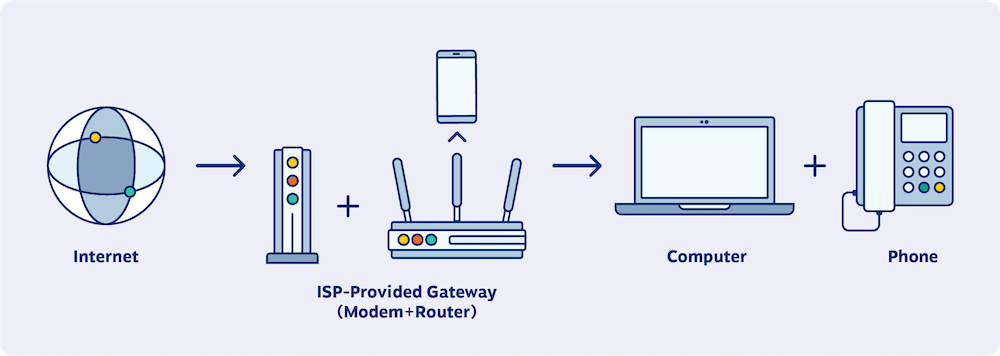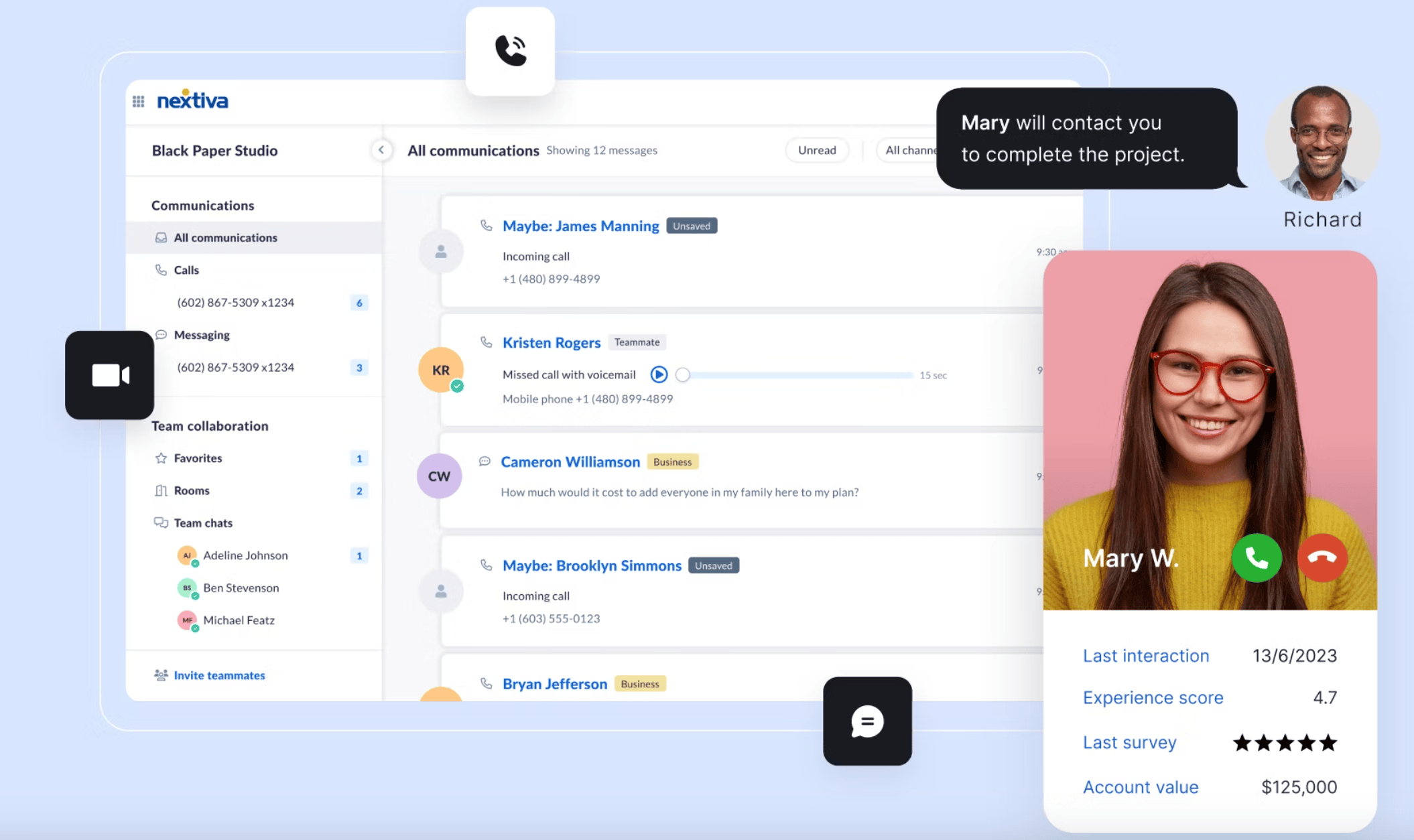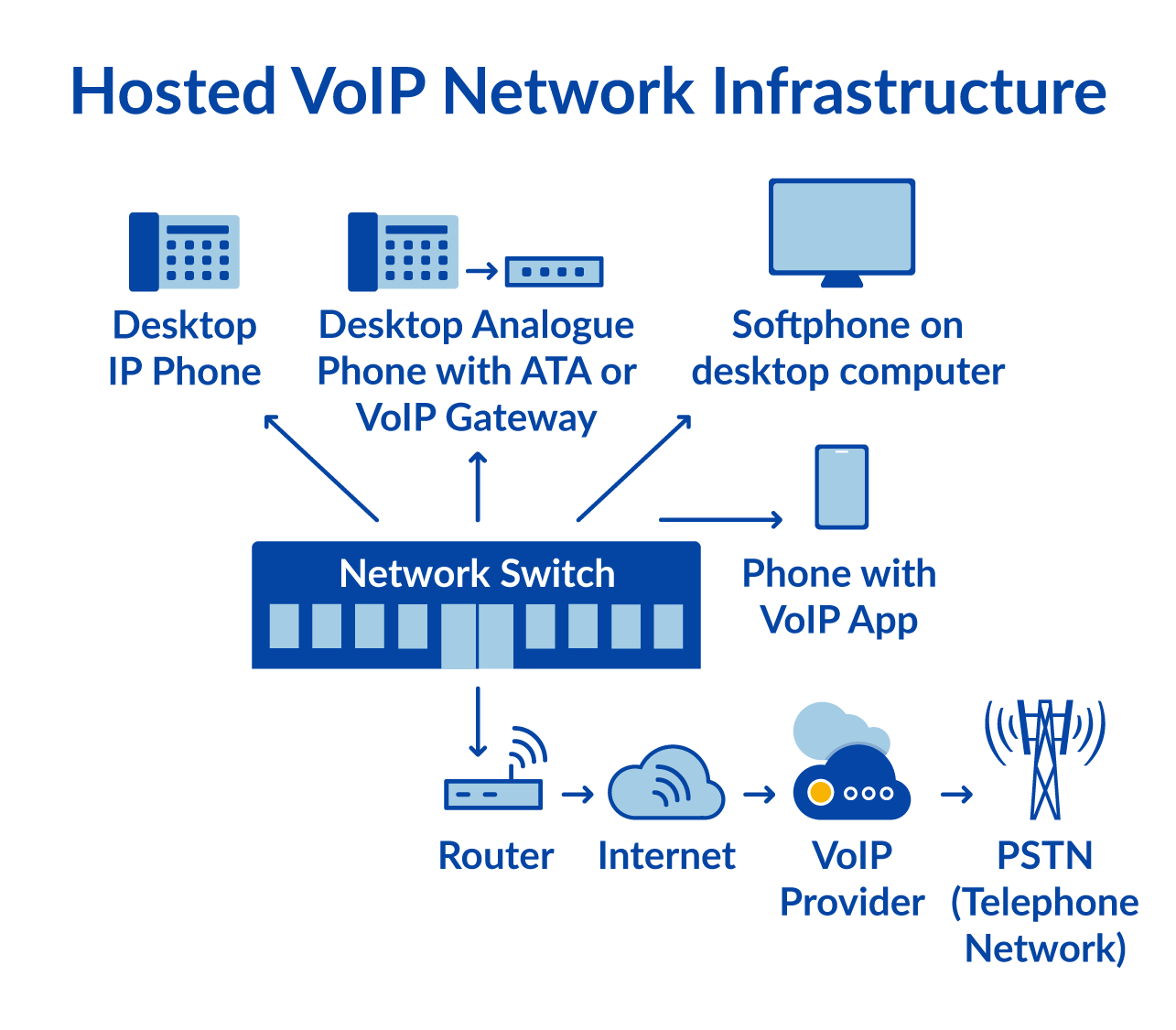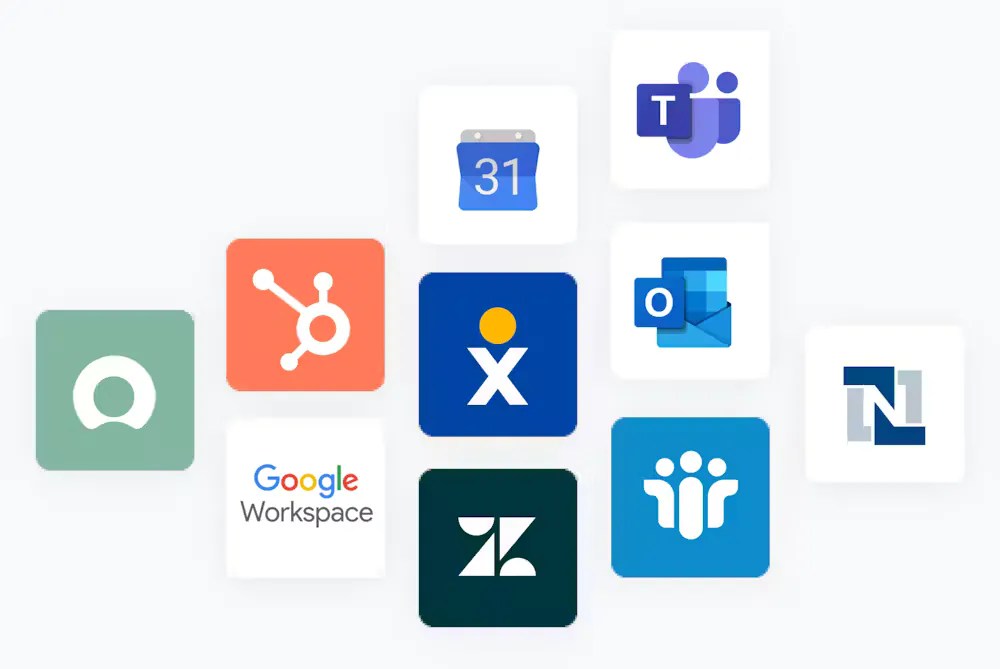

Imagine you’re in a horse race, lined up at the starting line against competitors using clunky, outdated modes of transportation. But you’ve got the keys to a blazing-fast Formula One race car — the latest cloud communications solutions.
Legacy communication systems are stagecoaches struggling to keep up, while cloud phone systems are finely tuned F1 cars built for speed and performance. Hop into one of these cloud supercars, and you’ll leave the competition in the dust.
Just like a powerful engine provides horsepower, these cloud solutions turbocharge your team’s workflows and efficiency. With their advanced capabilities at your fingertips, you can take your foot off the gas when worrying about outdated tech holding you back. Instead, focus on the road ahead to growth and success.
In this article, we evaluate five of the best cloud communications platforms available today. We’ll cover their key features, strengths, pricing, and ideal use cases — providing everything you need to select the option that propels your business forward.
Let’s cover some basics first.
Cloud communications are internet-based tools that manage voice and data communication. Instead of traditional physical phone lines and on-site servers, cloud communication uses remote servers (the “cloud”) hosted by a service provider. This makes it more scalable, flexible, and cost-effective compared to traditional methods.
You can make calls, send messages, and hold video conferences from any device with an internet connection.

Every time you call a client using an app like Skype or WhatsApp on your phone, you’re using cloud communications, or more specifically, cloud telephony. Other examples include joining a team meeting on Zoom or sharing a folder with your colleagues over Google Drive.
But what makes this cloud technology possible?
Understanding the key elements of cloud communications is like knowing what goes into a great recipe. It helps you appreciate not just the final dish but also how each ingredient contributes to its success.
Four of the key components of cloud communication include:

So why choose a cloud communications platform? The table below compares cloud communications with traditional systems across five crucial aspects.
| Feature | Cloud Communications | Traditional Systems |
|---|---|---|
| Scalability | Easily scales up or down with business needs; ideal for all company sizes | Often requires physical installation; less adaptable to change |
| Cost-effectiveness | Reduces upfront hardware costs and ongoing maintenance expenses | Involves large upfront investments in hardware and ongoing maintenance; tends to lack scalable pricing models |
| Flexibility and mobility | Supports remote work communication needs; accessible from anywhere with an internet connection | Limited to specific physical locations |
| Integration and automation | Seamlessly integrates business applications with enterprise communication tools to streamline processes | Limited integration capabilities, especially for cloud services |
| Advanced features and functions | Offers features such as video conferencing, instant messaging, and advanced VoIP services | Lacks modern telecommunication features: primarily voice-only |
The following section expands on these comparisons.
When you use cloud communications technologies, you’re choosing solutions that can grow with and adapt to your business.
For small businesses, they provide affordable access to advanced communication tools. For larger enterprises, they offer the capacity to handle a high volume of communications across multiple locations.
Whether you scale up or down, you’ll have a system with the flexibility to match your business needs without needing to worry about overhauling your entire communication infrastructure.
Investing in cloud communications saves you money on upfront hardware and ongoing maintenance costs.
Migrating from traditional on-premise phone systems to cloud systems comes with certain costs, but they’re often offset by short- and long-term savings and efficiencies, such as:
With cloud communications, you can work, learn, and connect with people from anywhere: at home, in a cafe, or while traveling. As long as you have an internet connection, you can access your communications tools just like you would access traditional communications tools in an office space.
This flexibility ensures that people can stay connected and get things done regardless of their location.
In fact, the majority of the American workforce has a clear preference for flexible working arrangements. According to McKinsey, when given the option for flexible work, 87% of people would take it.
This shows a growing demand for flexibility and mobility in the workplace, which technologies like cloud communications can provide.
Finally, with cloud-based technologies, you can easily hire diverse talent from all over the world: you’re not limited to local applicants. You can find the best people for the job no matter where they are.
Cloud communications simplify your work by letting you easily connect different business tools, such as customer relationship management (CRM) systems and email.
For example, when a site visitor fills out a contact form on your website, their information will automatically populate in your CRM, prompting an automatic email to your sales team.
This streamlines follow-ups and keeps everyone in the loop.
The technology also helps you reduce the chances of making mistakes by automating repetitive tasks, such as data entry, so you can focus on the important parts of your job.
Cloud communications give you more ways to connect with colleagues and share information.
Cloud communications allow you to access features such as video conferencing, instant messaging, and advanced VoIP telephony, which you can’t use with traditional phone systems.
This means you can talk, text, and see each other in real time or communicate asynchronously no matter where you are, making teamwork and staying in touch much easier.
The following are five of the best cloud communications providers out there and the types of companies they’re best for:
Keep reading for more details on each tool’s features, pricing, and abilities.

Nextiva is an all-in-one cloud-based communication solution with a comprehensive suite of business management tools, including VoIP phone services for making calls over the internet, video conferencing for virtual meetings, and CRM integrations to manage customer relationships.
With plans and features for every business size, it meets the needs of small businesses, growing companies, and enterprise organizations.
Pricing: Nextiva’s Essential pricing plan begins at $17.39/user monthly and offers unlimited voice and video calling, voicemail, toll-free numbers, unlimited internet fax, and Outlook/Google Contacts integrations.

Key features:
Best for small businesses seeking an easy-to-use cloud communications system that combines essential tools in one app. Nextiva’s platform is also suitable for larger enterprises needing a comprehensive, all-in-one, cloud-based solution to meet complex communication demands.

Connecteam is a robust workforce management app for connecting and engaging with non-desk and frontline employees.
It offers three product hubs, including:
Let’s say you run a small coffee shop. With Connecteam’s communications hub, you can use in-app messaging to send important updates throughout the day or ask questions.
You can also run quick surveys to gather input on new menu items or celebrate a new team member when they go above and beyond. This ensures smooth operations and a happy team, ultimately leading to better service and happier customers.
Pricing: The communications hub is free for small businesses of up to 10 employees. For teams of up to 30 employees, the pricing plans start at $29 monthly.
Key features:
Best for small businesses of up to 10 employees and companies with non-desk and frontline workers.

Plivo is a cloud-based communications platform that simplifies customer communications for startups, enterprises, and nonprofits.
Its main products include:
Its Plivo cloud contact center platform provides a comprehensive suite for customer service agents. With an omnichannel solution and features such as voice calling, live chat, and SMS messaging, it helps your agents manage multiple conversations and support queries efficiently.
Pricing: Contacto’s omnichannel solution starts at $39/user monthly for growing teams. You can also opt for voice-only or chat-only options, which start at $29/user monthly and $19/user monthly, respectively.
Key features:
Best for B2C customer service and contact center teams looking for an all-in-one communications management platform.

Vonage is a comprehensive cloud communications provider. Its suite of tools helps you simplify and personalize how you connect with your customers and teams.
The platform offers four main products:
Pricing: For teams of up to 100 people, Vonage’s unified communications service starts at $14.99/line monthly. To receive a quote for larger teams, you’ll need to contact the sales team.
Features:
Best for businesses focused on advanced customer engagement and commerce teams looking for an AI-powered customer communication solution.

OpenPhone is a collaborative business phone system built for teams, with a focus on simplicity and ease of use.
The platform offers six main products:
Pricing: OpenPhone offers a seven-day free trial. Pricing plans start at $19/per user monthly.
Features:
Best for startups and small businesses looking for a no-frills, user-friendly, collaborative customer communication platform.

Cloud communications make customer service better for everyone. Customers get faster, more personalized help, and staff in contact centers have easier, more efficient tools to manage and respond to customer needs.
The following key features offer these benefits:

Cloud communications safeguard your data with robust security features.
Encryption scrambles information during storage and transmission, while secure data centers with advanced physical and digital barriers keep it protected. Regular updates ensure these systems stay ahead of threats.
Compliance is built-in. Cloud providers adhere to industry standards (ISO 27001, SOC 2) and regional regulations (HIPAA, GDPR) for data privacy and handling. Data sovereignty ensures your information is stored according to legal jurisdictions.
While concerns like user error or malicious insider threats can exist in any communication system, cloud solutions mitigate these risks through features like multi-factor authentication and role-based access control.
Regular security assessments and disaster recovery plans offered by cloud providers further minimize potential downtime and data breaches.
Cloud communication systems prioritize reliability. Regular security assessments and disaster recovery plans minimize downtime and keep your communications flowing.
Constant vigilance is key. Real-time monitoring and automated alerts identify and address potential security issues promptly.
Cloud communications offer a secure and reliable ecosystem for customer interactions, giving you peace of mind while keeping your data protected.
Choosing the right cloud communications solution is critical for better business productivity and collaboration. With so many options on the market, you need to take a step back and really assess what you need.
Start by identifying the specific business communication capabilities you require – voice, video conferencing, messaging, contact center tools, and so on. Get a handle on how many users will need access and whether you have any industry-specific compliance or security boxes to check.
Once you know your requirements, you can start evaluating providers.
Research the top players and see how their offerings stack up against your checklist of must-haves. But don’t just look at features — pricing models, reliability, security, and uptime guarantees are crucial too.
You’ll also want to consider integration capabilities. The ideal solution will sync up seamlessly with the other apps and tools your teams use every day.

It’s equally important to think about the long-term when vetting providers. You’ll want a solution that can scale up or down easily as your headcount and needs evolve.
Look at each provider’s product roadmap — are they investing in new capabilities that could benefit you down the road?
User experience is another key factor. An affordable feature-rich solution is great but won’t drive adoption if it’s too clunky or complicated.
The implementation process itself requires careful planning too. Have a solid strategy for data migration, user training, optimizations, and overall change management.
Roll things out smoothly with comprehensive resources. And once your new system is in place, gather feedback regularly. Usage data and employee input will help you further refine and streamline processes over time.
Switching from legacy communications systems to the cloud gives you the tools you need to simplify your daily tasks and collaborate virtually in more creative and efficient ways.
Cloud communication is a feature-rich, secure, and cost-effective solution for businesses looking to stay connected and get things done whenever and however they work best.
Many cloud communications platforms can increase productivity. But for companies seeking a comprehensive and unified communications solution, Nextiva stands out with its blend of reliable customer-centric features, scalable and affordable pricing, and dedicated, amazing service team.

Nextiva is shaping the future of growth for all businesses. Start learning how your business can take everything to the next level.